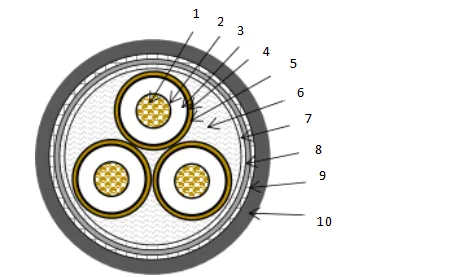10 月 . 14, 2024 14:06 Back to list
Durable Ductile Iron Gate Valve for Reliable Fluid Control Solutions
Ductile Iron Gate Valves A Comprehensive Overview
Ductile iron gate valves are essential components in various industrial and municipal applications, primarily used for the control of fluid flow in pipelines. Made from ductile iron—a type of cast iron known for its exceptional strength and ductility—these gate valves combine durability with performance, making them a preferred choice in the engineering and infrastructure sectors.
What is Ductile Iron?
Ductile iron, also known as spheroidal graphite iron, is characterized by its high tensile strength and improved ductility compared to traditional cast iron. The key feature that sets ductile iron apart is its microstructure, which consists of graphite nodules rather than flakes. This unique structure enhances the material's mechanical properties, allowing it to withstand higher stress and deformation without cracking. As a result, ductile iron has become the material of choice for manufacturing gate valves and other critical components.
Design and Functionality
A gate valve operates on a simple principle it either allows or prevents the flow of fluid through a pipeline. The basic design includes a disc (or gate) that moves up and down or side-to-side, controlling the flow. In ductile iron gate valves, the gate typically has a wedge shape that fits snugly into a seat when the valve is closed, ensuring a tight seal that minimizes leakage.
One of the primary advantages of gate valves is their ability to provide a straight-line flow, minimizing pressure loss. They are ideal for applications requiring minimal resistance to flow, such as in water distribution systems, sewage treatment, and heavy-duty industrial applications.
Advantages of Ductile Iron Gate Valves
1. Strength and Durability Due to their robust construction, ductile iron gate valves are capable of handling high pressures and temperatures, making them suitable for a wide range of applications.
ductile iron gate valve

3. Cost-Effectiveness Ductile iron is generally less expensive than other materials, such as stainless steel or bronze, yet offers comparable performance. This makes ductile iron gate valves a cost-effective solution for many projects.
4. Versatility These valves can be manufactured in various sizes and configurations, allowing for customization to meet specific industrial or municipal requirements.
5. Ease of Maintenance Ductile iron gate valves are designed for easy maintenance, ensuring that they can be serviced with minimal downtime, which is crucial in industrial settings.
Applications
Ductile iron gate valves find application in numerous fields, including
- Water Treatment and Distribution They are widely used in municipal water systems for isolating sections of pipelines and managing water supply. - Sewage and Wastewater Management These valves help control the flow of wastewater and are instrumental in sewage treatment plants. - Fire Protection Systems Gate valves are critical components in fire hydrant systems, allowing firefighters to control water supply during an emergency.
- Industrial Processes Many manufacturing processes involve the transportation of fluids, making ductile iron gate valves essential in sectors such as chemicals, pharmaceuticals, and oil and gas.
Conclusion
Ductile iron gate valves are indispensable in the control of fluid flow across various applications, thanks to their strength, durability, and cost-effectiveness. Their designs facilitate efficient operation, minimizing pressure loss and providing reliable service in critical environments. As industries continue to evolve, the demand for robust and reliable solutions like ductile iron gate valves will undoubtedly remain strong, ensuring their continued relevance in the engineering landscape. Whether in municipal systems or industrial setups, these valves stand as a testament to the benefits of advancements in material science and engineering design.
Share
-
Understanding the Differences Between Wafer Type Butterfly Valve and Lugged Butterfly ValveNewsOct.25,2024
-
The Efficiency of Wafer Type Butterfly Valve and Lugged Butterfly ValveNewsOct.25,2024
-
The Ultimate Guide to Industrial Swing Check Valve: Performance, Installation, and MaintenanceNewsOct.25,2024
-
Superior Performance with Industrial Swing Check Valve: The Essential Valve for Any SystemNewsOct.25,2024
-
Industrial Swing Check Valve: The Ideal Solution for Flow ControlNewsOct.25,2024
-
You Need to Know About Industrial Swing Check Valve: Functionality, Scope, and PerformanceNewsOct.25,2024